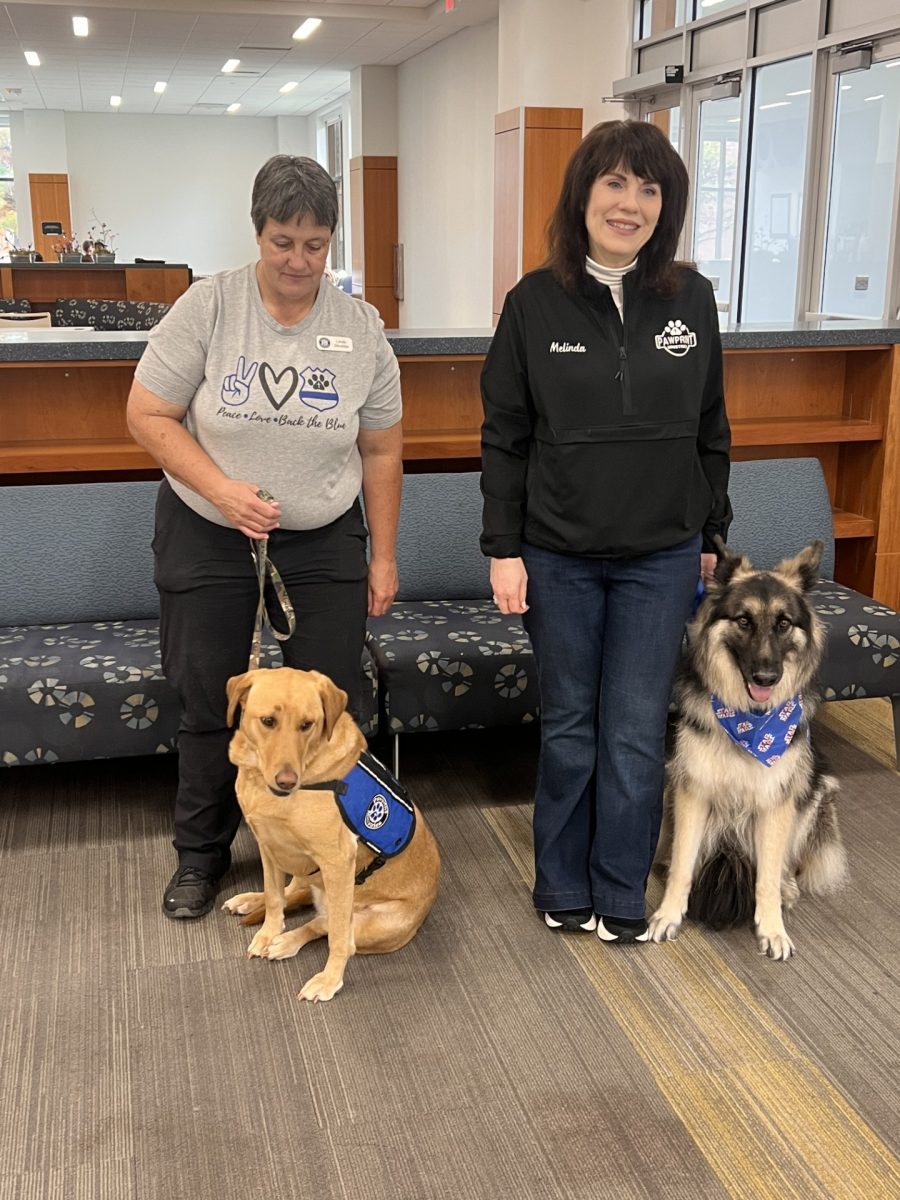Student Affairs partnered with PawPrint Ministries to provide students with comfort and anxiety relief during a tumultuous time on campus following the election results.
The dogs were stationed in the lobby of Millikin’s University Commons on Nov. 8 from 11 a.m.-2 p.m. Any students who were entering or exiting the building could easily see them and engage with the animals. The dogs wore blue vests with their names. They also displayed a message that explained they were friendly and petting was encouraged.
“I think it makes kind of a peaceful place that you can go and it doesn’t matter who you are,” Claire Walker, a student, said. “You just pet a dog and relax. You don’t have to think about anything that’s stressing you out. You can feel kind of like a kid again.”
PawPrint ministries is an organization founded by Jennifer Dahn. It started as a one-dog operation, but has since grown to now have over 45 trained dogs. All animals undergo a training program that lasts around 18 months to two years. It prepares the dogs for a variety of situations, such as disaster training and how to behave in potentially stressful times. They also continually train on a weekly basis.
“It’s definitely a good distraction from everyday college stress and it’s such a positive boost to your day to get to interact with the animals,” Breana Smith, a student, said.
All of the animals in the organization are actually the personal pets of the handlers. Melinda Rueter has been involved in PawPrint Ministries for almost three years now with her German Shepherd, Gambit. She rescued him as a puppy and initially never thought about getting involved in something like PawPrint. However, his mild temperament began to imply he might be well-suited for the job. After Gambit completed training, he quickly proved his skill through his calm and gentle persona in times requiring emotional support.
“I had a young child that had to testify in court, and the dogs can’t go in the courtroom, but they can be in the witness room,” Rueter said. “That child took his business card up on the stand and talked to the card instead of to the lawyers because it gave that sense of safety in that moment.”
Linda Strubbe got her dog, Ellie who was two years old at the time, during the COVID-19 pandemic. Strubbe was introduced to PawPrint ministries while she was writing her final paper for her Masters program. She contacted them and was accepted into the training program after Ellie proved her capability through suitability tests. Ellie started going to work with Strubbe and bonded well with others, which led Strubbe to believe Ellie was designed to be in comfort animal services.
“When I got Ellie, I had lost both my parents and I know the comfort, just on that personal level, what she did for me,” Strubbe said. “So when I saw her bonding with all the police officers, it seemed to reduce their stress and they would come in and play with her. She loved it and they seemed to love it.”
Comfort animals are able to provide a unique service, especially to college students who may have family pets at home they had to leave behind when making the transition to school. Their presence can fill a void that the students may not have known existed in the first place.
“It just feels so comforting, like there’s so many classes you have to do, and so many hard things you have to do every day,” Walker said. “It’s nice to just pet animals, especially when my animals are like two hours away and I can’t see them ever.”
The work PawPrint Ministries does in times of need extends beyond the initial impact. Rueter and Strubbe both testified to the lasting impressions their dogs have made on the people they help.
“We went to a tragedy deployment, and then I saw one of the people who visited with her later in the community. He remembered her and came up and said it was so helpful for him that she was there in his time of need,” Strubbe said. “That’s what does it for me. I really enjoy the fact that she can bring so much comfort and joy to other people.”
Rueter and Strubbe are just two individuals a part of a much larger organization. Everyone enlists their dogs for different reasons, but the intent is always the same. There is a fundamental desire to help others who may need comfort or support in times of distress, fear, anxiety, and loneliness.
“I think every handler has a story on why they do this and why they’re here. I think that’s what the reward is for us is knowing that we’ve made a difference,” Rueter said. “Sometimes that’s all you can offer another human being, is that kindness and that comfort.”


